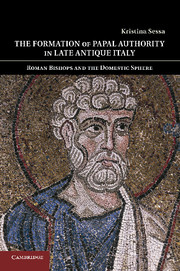Book contents
- Frontmatter
- Contents
- Acknowledgments
- Abbreviations
- Map Late Roman Italy
- Roman Bishops from Peter to Gregory I
- Introduction: Household Management and the Bishop of Rome
- Chapter 1 The Late Roman Household in Italy
- Chapter 2 From Dominion to Dispensatio: Stewardship as an Elite Ideal
- Chapter 3 Primus Cultor: Episcopal Householding in Theory and Practice
- Chapter 4 Overseeing the Overseer: Bishops and Lay Households
- Chapter 5 Cultivating the Clerical Household: Marriage, Property, and Inheritance
- Chapter 6 Mistrusting The Bishop: Succession, Stewardship, and Sex in the Laurentian Schism
- Chapter 7 The Household and The Bishop: Authority, Cooperation, and Competition in the Gesta Martyrum
- Conclusion
- Bibliography
- Index
- References
Chapter 6 - Mistrusting The Bishop: Succession, Stewardship, and Sex in the Laurentian Schism
Published online by Cambridge University Press: 05 December 2011
- Frontmatter
- Contents
- Acknowledgments
- Abbreviations
- Map Late Roman Italy
- Roman Bishops from Peter to Gregory I
- Introduction: Household Management and the Bishop of Rome
- Chapter 1 The Late Roman Household in Italy
- Chapter 2 From Dominion to Dispensatio: Stewardship as an Elite Ideal
- Chapter 3 Primus Cultor: Episcopal Householding in Theory and Practice
- Chapter 4 Overseeing the Overseer: Bishops and Lay Households
- Chapter 5 Cultivating the Clerical Household: Marriage, Property, and Inheritance
- Chapter 6 Mistrusting The Bishop: Succession, Stewardship, and Sex in the Laurentian Schism
- Chapter 7 The Household and The Bishop: Authority, Cooperation, and Competition in the Gesta Martyrum
- Conclusion
- Bibliography
- Index
- References
Summary
“Indeed no one judges a master in his treatment of a slave!”
Thus spoke bassus, ex consul, householder and episcopal critic. His sharp rebuke was aimed at Xystus III, the mid-fifth-century Roman bishop who had audaciously interfered in the running of another man's domus. A dispute had arisen in Bassus’ house between a young man named Epifanius, who claimed to be a freeborn nobleman and ward of the dominus, and the aristocrat's slaves, and Bassus had sided with the servi. To add insult to injury, Bassus refused to acknowledge Epifanius’ freeborn status. When Xystus came to the house to intercede on the young man's behalf, Bassus rudely dismissed him, metaphorically slamming the door in the bishop's face by denying him the right to participate in a layman's domestic affairs.
Although this incident is entirely fictitious, appearing in an early sixth-century narrative about a trial involving Xystus III and two imaginary aristocratic householders, it expresses the enormous tension and ill will that sometimes characterized the relationship between householders and bishops in late antique Rome. Earlier chapters examined some rhetorical and practical means through which Roman bishops endeavored to establish their authority as estate managers with respect to lay households and the domūs of clergy. Although their successes were outlined, their limitations and even failures were also emphasized. We have yet to explore more openly stated objections to this particular permutation of episcopal leadership, however, nor have we addressed in any detail the many dissonances between domestic and ecclesiastical models of estate management. These dissonances made it difficult for lay people and clerics to trust their bishop in some of the most sensitive areas of household life, such as the administration of ecclesiastical property and the discipline of the body. In many respects, the bishop's role as a householder-steward was extraordinarily controversial.
- Type
- Chapter
- Information
- The Formation of Papal Authority in Late Antique ItalyRoman Bishops and the Domestic Sphere, pp. 208 - 246Publisher: Cambridge University PressPrint publication year: 2011



